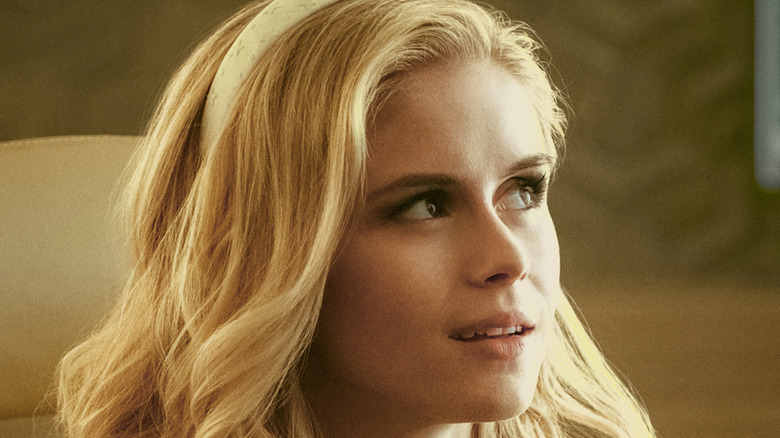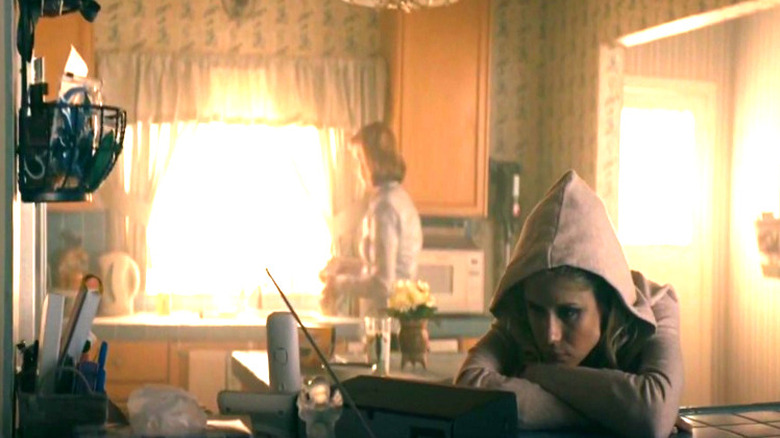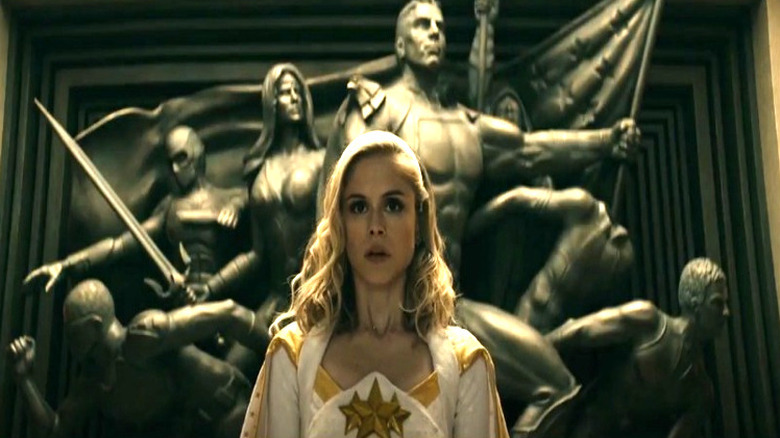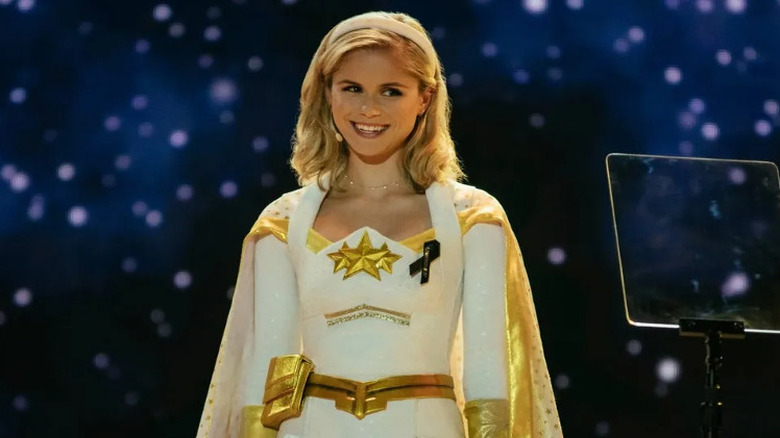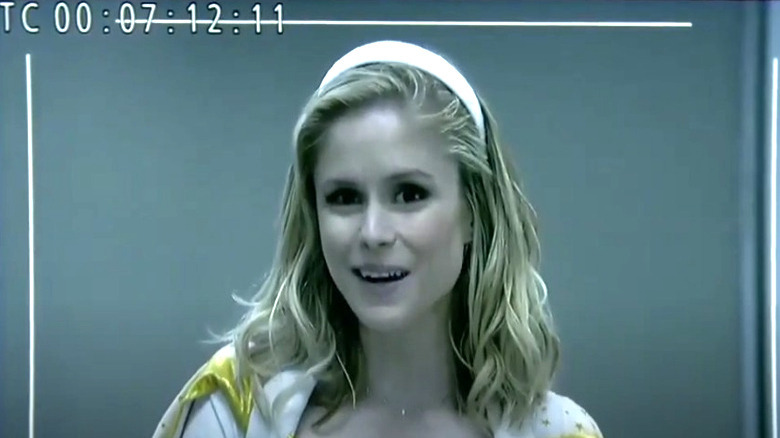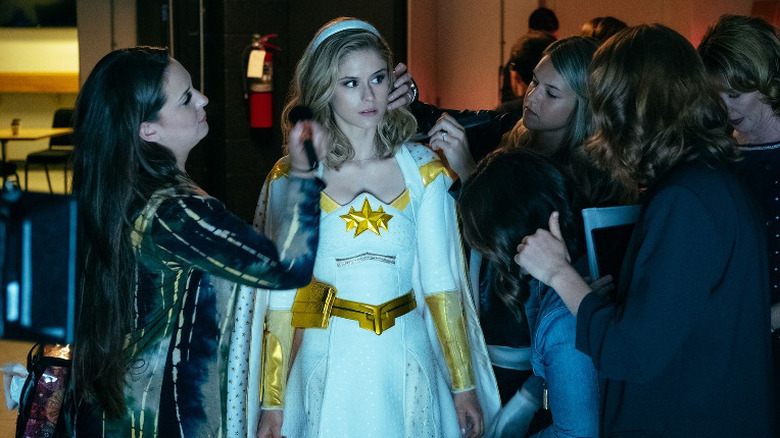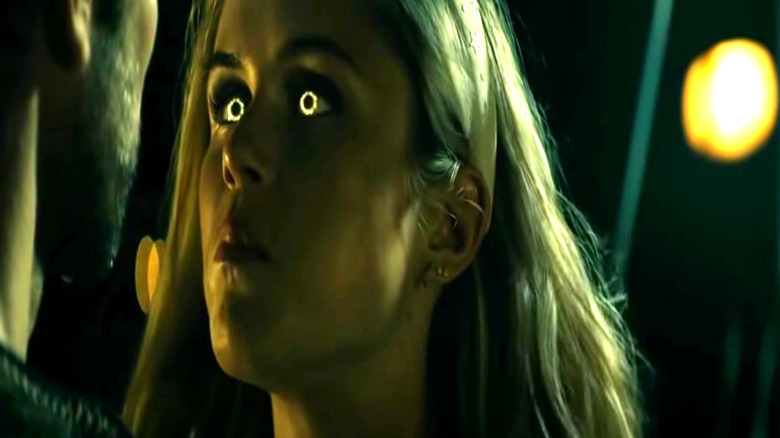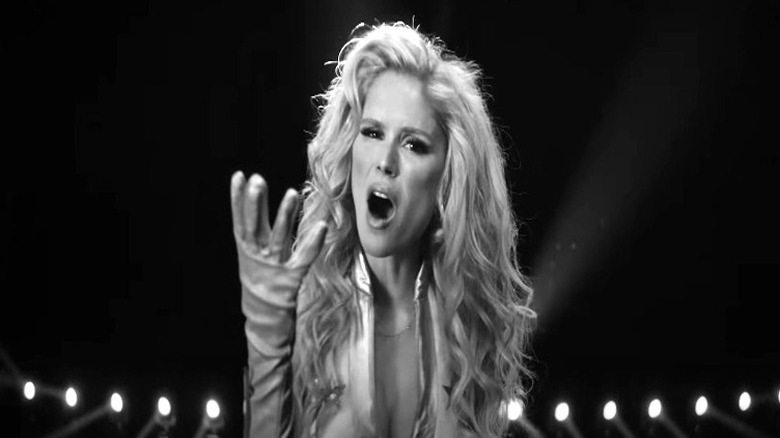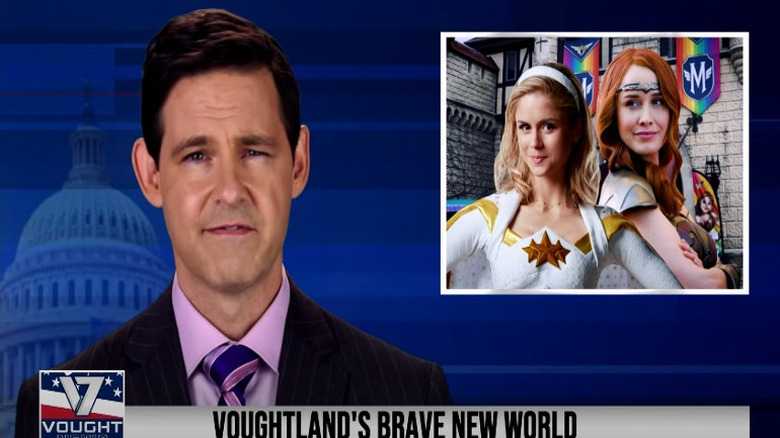The Untold Truth Of The Boys' Starlight
There aren't a lot of genuine heroes in Amazon's series "The Boys." Based on the comic book written by Garth Ennis, the show exists in a bleak and cynical world populated by selfish and violent superhuman individuals solely concerned with their own brand as opposed to keeping anyone safe. Created by and micromanaged by the evil corporation Vought International, they spend their time as mascots, actors, and performers rather than fighting corruption.
Annie January, better known as Starlight, is a true beacon of hope in this oppressively dark society. This "Defender of Des Moines" stepped into the limelight when Vought's premiere superhero league the Seven brought her on to replace a dangerous hero named Lamp Lighter. Life as one of the biggest superheroes in the world is difficult for her since she actually cares about humanity and wants to keep everyone safe. After becoming thoroughly disillusioned with Vought's tactics, she tries to save the world by fighting the company from the inside — exposing their secrets at every opportunity.
Her resilience and selflessness make her one of the most fascinating characters in the series. To honor that status, we're going to take a look at some aspects of her character that have yet to be fully explored on the show, in addition to some behind the scenes information that some fans may not be aware of.
Her origin was darker than you think
In the Amazon series, Annie January is an idealistic young woman growing up in Iowa with dreams of making it big as a superhero. Following the departure of her father, Annie's mother raises her as a single parent; their time is spent going to pageants, Christian events, saving locals, and training. It is presented as a difficult but overall standard existence that inevitably gave her an optimistic view of the world. Later on, we learn that her mother agreed for her to be given the drug Compound-V in order to make her super, resulting in her father abandoning them and Annie being continuously exploited.
Depressing as that may be, it doesn't even hold a candle to what happened to the comic book character she's based on. In the comics, she tells her origin story to Hughie on a park bench. Born with superpowers, Annie blinded her parents at birth when she spontaneously generated an intense blast of light while still in the hospital. Unable to raise Annie, her parents sold her to Vought. She was then put in foster care and forced to perform in pageants. She had to live with the guilt of disabling her parents while residing with people who only cared about her as a trophy, and her childhood was virtually non-existent.
The Seven wasn't her first hero team
When we first meet Starfire at the start of the series, she's auditioning to be let into the Seven following Lamp Lighter's departure. It's implied that she's never been able to branch out of her status as the "Defender of Des Moines" and getting the spot on the world's greatest superhero team would be a dream come true. Of course, that dream quickly morphs into her own personal hell when she's assaulted by fellow super the Deep, is given no support by Vought, and learns that superheroes don't actually do anything.
In the comics, however, the Seven aren't Starlight's first team. Since she was owned by Vought, they were able to place her on their junior team, the Young Americans. While counting herself among their ranks, she started dating their leader Drummer Boy. After surviving horrendous actions from the Seven, she returned home to find Drummer Boy cheating on her with Holy Mary (a hero dressed as a nun) — an action he blames on her absence from the team.
Her part was expanded for the show
Starlight isn't a major character in the comics. Her involvement is important to demonstrate just how twisted Vought's heroes are and to emphasize how evil will try to corrupt innocence, but she isn't a major driving force of the action. When adapting the books for television, however, the showrunners decided to expand her character and make her one of the protagonists of the series.
While breaking down each character to Rotten Tomatoes, showrunner Eric Kripke explained the creative decision, citing the utter lack of likable characters in the source material. In terms of her design, they didn't change much. Instead, they focused on making her a main character. "We mostly just muscled up her story," Kripke said. "I think in the books she's a supporting character, and we really wanted her to be one of the leads, frankly for the simple reason that just truly likable characters in this world are really thin on the ground."
Eric Kripke was willing to fight for Erin Moriarty
Finding the right actor for a part can be difficult. Sometimes, the person we end up seeing onscreen wasn't the first choice. Other times, however, the creative force behind a project will believe in a particular actor so strongly that they're willing to fight for their casting. Francis Ford Coppola, for instance, really struggled to get the studio to approve Al Pacino as Michael in "The Godfather."
This was almost the case with Erin Moriarty when she was cast as Annie January/Starlight. The actor revealed during a panel at New York Comic Con that she wasn't sure if she'd get the part. After auditioning, she went months without hearing anything. Saying she "put it in the massive bag full of roles that I really wanted and I haven't gotten," she eventually doublechecked with her managers to find out if they'd ever heard anything about the audition — and she was informed she would be testing for the part the very next day.
After she completed a 90-minute test that made her feel like she had "run a marathon," showrunner Eric Kripke told her, "Just so you know, no matter what happens, I adore you and you're my creative choice whether you get it or not. Go home knowing that." That certainly sounds like he was ready to convince the powers that be that she was the right choice. Whether he had to is unclear.
Getting her costume right was crucial
Starlight has two costumes in the series. The first, with its gold lining, cape, skirt, and boots, is reminiscent of the garb worn by Mary Marvel from DC Comics. Like Mary's, the outfit exudes innocence, telling you everything you need to know about this character's priorities — especially when you compare it to her second costume.
After she's accepted into the Seven, the PR people decide Starlight's costume isn't sending the right kind of message. While they claim that they want her to look empowering, they give her a skimpy one-piece that's just another one of the several demeaning tasks Vought requires of her. She wears it at first because she wants to be a team player, but by the end of the second season, when she's established that she won't be playing by Vought's rules anymore, she goes back to her original costume.
According to costume designers Carrie Grace and Laura Jean Shannon, the intention with the original suit was to make it appear wholesome while still obviously being a superhero costume. They also wanted to make sure that it looked like something a teenager from Iowa could make on her own on a budget. That attention to detail in designing the costume also guaranteed the second, more revealing suit would almost appear alien to this woman who just wants to make the world a better place.
A very difficult scene
A truly shocking moment in "The Boys" comic book is Starlight's horrific sexual assault at the hands of her new team members. She joined the Seven because she wanted to do some good in the world, and one of the first things that happens to her upon arriving is non-consensual sexual acts committed by the very people she used to idolize. It's grueling to witness and sets a precedent early on that these stories will go places designed to make the audience uncomfortable.
A truncated version of the scene also occurs in the series. The difference here is that the sole perpetrator of this perverse violence is the Deep. While that doesn't make the trauma she suffers any more excusable, it tones down the attack enough to make sure the audience knows exactly what's going on without lingering on the physical act itself.
As discussed during an interview with Kripke at the London Screenwriting Festival, that scene was incredibly difficult for Kripke. He made sure to take true stories into account and work out the details of the scene with Moriarty and Chase Crawford before moving forward.
Her song was a massive hit
It's revealed in the first season that Starlight is a very talented singer. We get to see the ultimate expression of that in Season 2, when she performs a song memorializing the fallen "hero" Translucent. The song is called "Never Truly Vanish" (an obvious pun on his power of invisibility) and it is ludicrously theatrical and wholly inappropriate when considering the kind of man Translucent was.
Within the universe of "The Boys," as reported by Vaught News Network anchorman Cameron Coleman, the song was also a smash hit, spending at least five weeks at the top of the charts. In the real world, the song was designed to be a satire of over-the-top power ballads, according to composer Christopher Lennertz. As Insider reported, Lennertz said Kripke's marching orders were to deliver "an Adele-meets-Celine-Dion-meets-Whitney showstopper, over-the-top power ballad." He succeeded — and the song actually went on to pick up an Emmy nomination for outstanding original music and lyrics.
She stayed busy between seasons
The Vought News Network also provided some valuable information (however much it might be spun to make Vought appear the be the greatest organization in the world) in terms of what the heroes got themselves up to between Seasons 2 and 3. For instance, Starlight's decision to change back into her original costume saw huge spikes in sales of her wardrobe during Halloween. She outsold many of her peers and even rivaled Homelander.
She also worked with Queen Maeve to help promote the opening of the Vaughtland park Inclusive Kingdom. While it's likely an empty gesture meant to make consumers believe the company is embracing diversity, it's still nice to know that Starlight and Maeve are being used to promote progressive ideals — whether or not the executives greenlighting the whole thing actually believe in them. She was also hired to host a reality show trying to find a new member of the Seven, with her old flame Drummer Boy listed as one of the contestants.
